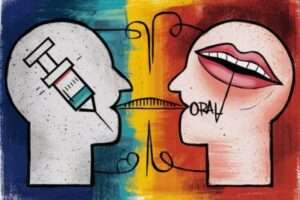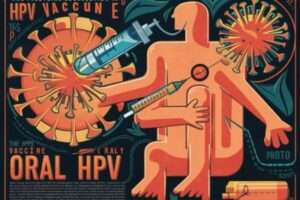HPV Vaccine and Oral HPV: Understanding the Connection and Protection
Have you ever wondered if the HPV vaccine could protect you from oral HPV? With the rising awareness of HPV-related cancers, including those affecting the mouth and throat, it’s a question on many people’s minds. In this comprehensive guide, we’ll explore the relationship between the HPV vaccine and oral HPV prevention, providing you with the latest information and expert insights to help you make informed decisions about your health.
Butyric Acid: The Gut-Friendly Compound You Need to Know About

Table of Contents
ToggleWhat is HPV and Why Should We Care?
Human Papillomavirus (HPV) is a group of more than 200 related viruses, some of which can cause various types of cancer. While most people associate HPV with cervical cancer, it’s important to understand that HPV can also lead to cancers of the mouth, throat, and other areas of the body.
Syphilis Testing: A Comprehensive Guide to Diagnosis and Screening

According to the Centers for Disease Control and Prevention (CDC), HPV is so common that nearly all sexually active people will get it at some point in their lives. While most infections clear up on their own, some persist and can lead to serious health problems.
Understanding Oral HPV
Oral HPV refers to the presence of HPV in the mouth and throat. This type of infection can potentially lead to oropharyngeal cancer, which affects the back of the throat, including the base of the tongue and tonsils. The American Cancer Society reports that HPV causes about 70% of oropharyngeal cancers in the United States.
Oral Gonorrhea: A Comprehensive Guide to Symptoms, Diagnosis and Treatment

Key facts about oral HPV:
1. Transmission: Oral HPV is primarily transmitted through oral sex but can also spread through deep kissing or other forms of close mouth-to-mouth contact.
2. Prevalence: According to a study published in the Annals of Internal Medicine, about 7% of Americans aged 14 to 69 have oral HPV at any given time.
3. Risk factors: Men, smokers, and people with multiple sexual partners are at higher risk for oral HPV infection.
The HPV Vaccine: A Brief Overview
The HPV vaccine was initially developed to prevent cervical cancer and genital warts. There are currently three FDA-approved HPV vaccines:
1. Gardasil: Protects against HPV types 6, 11, 16, and 18
2. Gardasil 9: Protects against the same four types as Gardasil, plus five additional high-risk types
3. Cervarix: Protects against HPV types 16 and 18
The CDC recommends routine HPV vaccination for all adolescents starting at age 11 or 12, though it can be given as early as age 9. Catch-up vaccination is recommended for everyone through age 26 who hasn’t been adequately vaccinated.
Does the HPV Vaccine Prevent Oral HPV?
While the HPV vaccine wasn’t specifically designed to prevent oral HPV, growing evidence suggests that it may indeed offer protection against oral HPV infections. Let’s dive into the research:
Hepatitis A, B, and C: Understanding the Differences and Similarities
1. Reduced oral HPV prevalence: A study published in the Journal of Clinical Oncology found that the prevalence of oral HPV infections was 88% lower in young adults who had received at least one dose of the HPV vaccine compared to those who were unvaccinated.
2. Cross-protection: The vaccine’s ability to prevent genital HPV infections suggests it may also be effective against oral infections, as the virus types are the same.
3. Ongoing research: While more long-term studies are needed, early results are promising. The National Cancer Institute is currently conducting research to further evaluate the vaccine’s effectiveness against oral HPV.
It’s important to note that while the vaccine appears to offer significant protection, it doesn’t guarantee complete immunity against all types of HPV that can infect the mouth and throat.
Understanding Hepatitis B: Transmission, Prevention and Treatment
Maximizing Protection Against Oral HPV
While the HPV vaccine is a powerful tool in preventing HPV-related cancers, including those of the mouth and throat, there are additional steps you can take to reduce your risk:
1. Get vaccinated early: The vaccine is most effective when given before exposure to HPV, which is why it’s recommended for adolescents.
2. Practice safe sex: Use barrier methods like condoms and dental dams during oral sex to reduce the risk of HPV transmission.
3. Limit sexual partners: Having fewer sexual partners can decrease your exposure to HPV.
4. Quit smoking: Smoking weakens the immune system and may make it harder for your body to clear HPV infections.
5. Regular dental check-ups: Your dentist can help detect early signs of oral cancer during routine examinations.
The Importance of HPV Vaccination for Everyone
While the HPV vaccine was initially marketed primarily for girls to prevent cervical cancer, it’s now recommended for both males and females. Here’s why:
1. Cancer prevention: The vaccine can help prevent multiple types of HPV-related cancers, including those of the mouth, throat, anus, and penis in males.
2. Herd immunity: Widespread vaccination helps reduce the overall prevalence of HPV in the population, protecting even those who aren’t vaccinated.
3. Equal responsibility: Both men and women play a role in transmitting HPV, so it’s important for everyone to be protected.
Addressing Common Concerns About the HPV Vaccine
Despite its proven effectiveness and safety, some people still have concerns about the HPV vaccine. Let’s address a few common questions:
1. Is the vaccine safe? Yes, the HPV vaccine has been thoroughly tested and is continuously monitored for safety. The most common side effects are mild, such as pain at the injection site.
2. Can the vaccine cause HPV or cancer? No, the vaccine contains no live virus and cannot cause HPV infection or cancer.
3. Is it still beneficial for adults? While the vaccine is most effective when given before exposure to HPV, it can still provide protection for many adults who may not have been exposed to all the HPV types covered by the vaccine.
Conclusion
While the HPV vaccine wasn’t originally designed to prevent oral HPV, emerging research suggests it may offer significant protection against these infections. Combined with other preventive measures, vaccination remains one of the most effective tools we have in reducing the risk of HPV-related cancers, including those of the mouth and throat.
Remember, it’s never too late to talk to your healthcare provider about the HPV vaccine and your individual risk factors. By staying informed and taking proactive steps, you can play an active role in protecting your health and the health of those around you.
Reference to External Sources:
1. Centers for Disease Control and Prevention (CDC) – HPV Vaccine Information:
2. National Cancer Institute – HPV and Cancer:
3. American Cancer Society – HPV and Cancer:
4. World Health Organization (WHO) – Human papillomavirus (HPV) and cervical cancer:
5. Journal of Clinical Oncology – HPV Vaccination and the Risk of Invasive HPV-Related Cancers:


